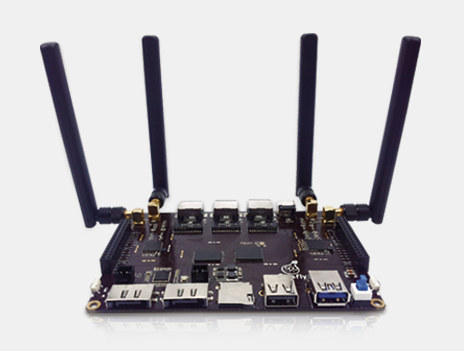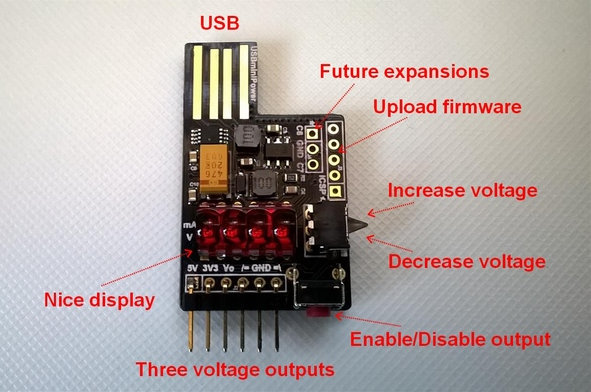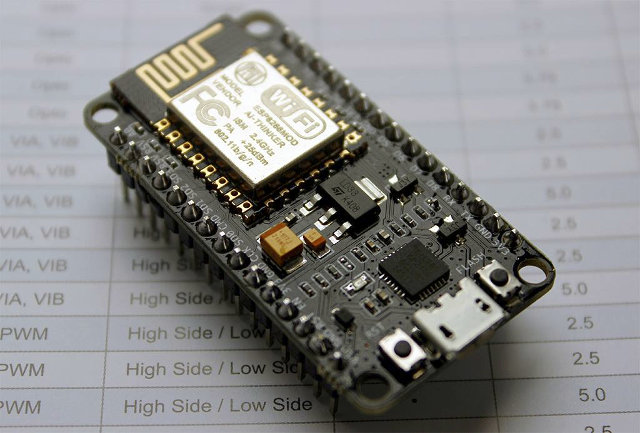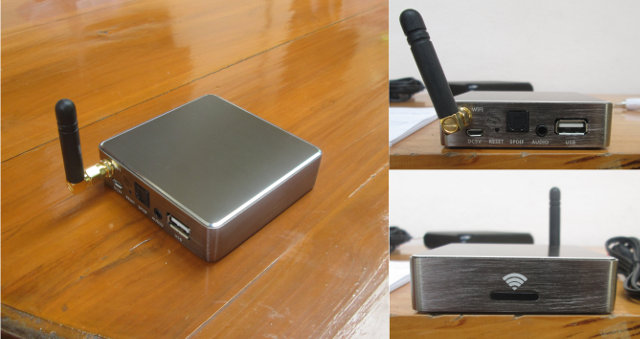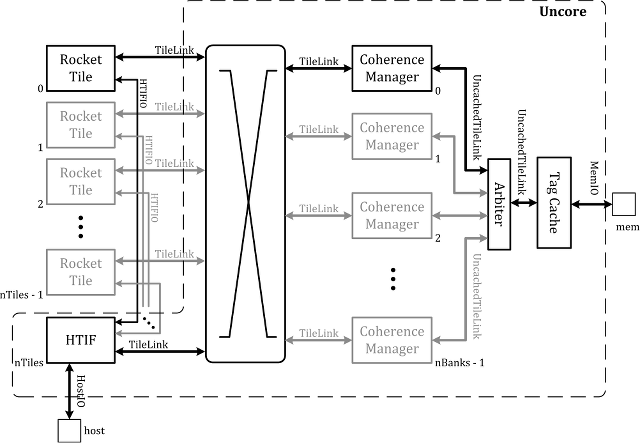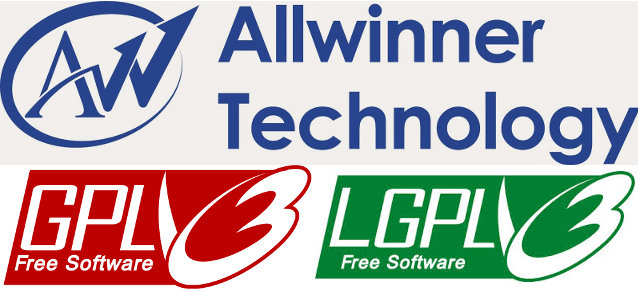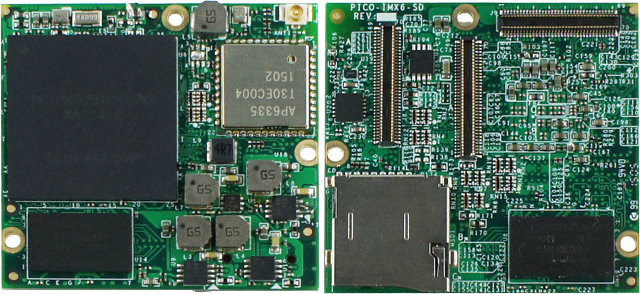When I write about a new processor with a PowerVR GPU, I can be sure there will be one or two comments saying something like “It has a PowerVR GPU, it’s a non-starter”, mostly because of the status of graphics drivers in Linux. Luc Verhaegen (libv) also made a presentation at FOSDEM 2013 listing various open source projects for GPUs found in ARM processors and PowerVR was the only one without any community project. Bear in mind that apart from Nvidia, and to some extend Broadcom for the VideoCore IV GPU found in BCM2835 / BCM2836 processors used in Raspberry Pi boards, no other companies have released user space drivers for their GPUs, and all work is done by volunteers for other open source GPU drivers, and I’m not sure any of them work 100% yet. Imagination has already provided working GPU drivers for their MIPS Creator-CI20 board, these are […]
FireWRT is an OpenWRT 802.11ac Board Powered by Mediatek MT7621A Processor
There are plenty of low cost 802.11n routers or boards supporting OpenWRT, even starting at $10 or less such as A5-V11 mini router, but if you’re looking for something a bit more powerful with 802.11ac connectivity, options are much more limited, especially if you need something at a lower cost. One option is Xiaomi MiWiFi router based on Mediatek MT7620A with 64MB RAM, and T-Firefly team is now working on FireWRT board based on the more powerful MT7621A processor coupled with 512 MB RAM, and 16 MB SPI flash. FireWRT specifications: Wi-Fi SoC – Mediatek MT7621A dual core MIPS 1004Kc processor @ 880MHz System Memory – 512 MB DDR3 (Beta version: 256 MB) Storage – 16 MB SPI flash memory, 2x SATA 3.0 ports, micro SD card slot Wi-Fi 802.11 b/g/n @ 2.4GHz up to 300Mbps 802.11 a/n/ac @ 5 GHz, up to 867Mbps (AC1200 class router) External High-Gain Antennas […]
USBminiPower USB Power Supply Delivers 3 Outputs: 5V, 3.3V, and a Variable Output up to 14.3V (Crowdfunding)
Yesterday, I found out about a cheap 5V/3.3V USB power supply board, YwRobot MB-102, selling for $1 shipped on Ebay, but one person lamented the lack of 1.8V output, which may be required for example for modules like AsiaRF AWM002 that takes both 3.3V and 1.8V. One way is make your own power board, and get an expensive lab power supply, but I got a solution in my inbox this morning, with USBminiPower, as tiny USB power supply board with three output: 5V, 3.3V and a variable pin between 1V and 14.3V, as well as a 4 digit LED display showing the voltage and intensity just like Charger Doctor. USBminiPower specifications: MCU – Microchip PIC16 MCU (several are supported) Voltage outputs – 5V (from USB port), controllable 3.3V, and controllable & adjustable 1V … 14.3V Display – 4 Digit red LED to display intensity and voltage Max Power – 2.45 […]
NodeMCU is both a Breadboard-Friendly ESP8266 Wi-Fi Board and a LUA based Firmware
NodeMCU is a LUA based interactive firmware for Expressif ESP8622 Wi-Fi SoC, as well as an open source hardware board that contrary to the $3 ESP8266 Wi-Fi modules includes a CP2102 TTL to USB chip for programming and debugging, is breadboard-friendly, and can simply be powered via its micro USB port. Let’s checkout the hardware first. The latest version of the board (V1.0) has the following specifications and features: Wi-Fi Module – ESP-12E module similar to ESP-12 module but with 6 extra GPIOs. USB – micro USB port for power, programming and debugging Headers – 2x 2.54mm 15-pin header with access to GPIOs, SPI, UART, ADC, and power pins Misc – Reset and Flash buttons Power – 5V via micro USB port Dimensions – 49 x 24.5 x 13mm The hardware documentation for the board can be found on nodemcu-devkit repo, including schematics and PCB layout designed with Altium Designer, […]
RaidSonic Releases Firmware and Source Code for Atheros AR9331 Wi-Fi Audio Streamers
RaidSonic is a German company releasing products such as media players and multimedia accessories under their ICY BOX brand. One of those products is ICY Box IB-MP401Air music streaming received based on Atheros AR9331, and that looks very similar to SoundMate M2 I reviewed last year. But if you look on their product page, you’ll find out a few download links: ICY BOX IB-MP401Air (multilang) – The Quick Start Guide and User’s manual in English and German IB-MP401Air (Source code) – a 648 MB rar file with source code for U-boot and OpenWRT IB-MP401Air (Firmware) – The firmware IB-MP401Air (Open Source Software) – Just the open source licenses So I’ve downloaded the source code file (IB-MP401Air_Sources_and%20License_Terms.rar) to have a look. It has two compressed files, one with the license, and IB-MP401Air_Sources.tar.gz with the source code.
|
1 2 3 4 5 6 7 |
tar xzvf IB-MP401Air_Sources.tar.gz cd dns320B_GPL20150212/ ls -l total 12 -rwxr--r-- 1 jaufranc jaufranc 1400 Apr 16 16:49 building-the-firmware.txt drwxr-xr-x 14 jaufranc jaufranc 4096 Feb 12 10:54 dns320B_GPL20150212 -rwxr--r-- 1 jaufranc jaufranc 925 Feb 12 08:25 making-u-boot.txt |
The file showing how to build the firmware (OpenWRT) explains you should not use […]
lowRISC Open Source SoC Project Announces its First Release with Tutorials for Simulators and Zedboard
lowRISC project aims to produce a completely open-source SoC (System-on-Chip) based on the 64-bit RISC-V instruction set architecture, as well as a corresponding development board, thus eventually producing a fully open hardware systems. The project has now announced its first release “tagged memory preview release” with a tutorial explaining how this has all been designed, and how to run simulations with software tools, or FPGA boards such as Zedboard. The project is based on Rocket core, written in Chisel language by the RISC-V team at UC Berkeley. Chisel can generate code to produce a cycle-accurate C++ emulator, Verilog optimised for FPGAs or Verilog for use in an ASIC flow.If you want to try it out, you’ll need a Linux machine, preferably running Ubuntu 14.04 64-bit, with GNU GCC 4.8 installed, and follow the tutorial in order to get the source code, and build tools such as riscv64-unknown-elf-gcc compiler, and […]
Allwinner CedarX Media Codec Library GPL/LGPL Compliance Update
Last month, I wrote about potential open source licenses and VP6 copyright infringement by Allwinner with their CedarX media codec library, and then since there’s been a few developments. First, Allwinner sent me an email saying they’ve now updated Cedarx library and referring my previous article. Here’s an extract: Here, I have some update of the Allwinner’s open-source status. We have done a lot of discussion with the developers from the linux-sunxi communication about the software license of CedarX. For each question or requirement asked by the developers, Allwinner has identify and try to give the best solution. Now, we believe Allwinner’s CedarX license is fully compliant and resolves concerns from the community. And you can take the announcement https://www.mail-archive.com/[email protected]/msg10597.html as a reference. Allwinner is always supporting the open-source, and try to do better and better. You can see some update on the github https://github.com/allwinner-zh, and some feedback from developers: […]
TechNexion Introduces Intel Edison Compatible PICO-iMX6 SoM and DWARF Board
Intel Edison is a board made for wearables featuring an SoC with Intel Atom and Quark CPU cores. TechNexion, an embedded systems company based in Taiwan, has decided to make a mechanically and electrically compatible system-on-module featuring Frescale i.MX6 Solo or Duallite ARM Cortex A9 processor called PICO-iMX6. The company is also providing a PICO-DWARF baseboard that’s both compatible with PICO-iMX6 SoM and Edison board. DWARF stands for “Drones, Wearables, Appliances, Robotics and Fun”, so that pretty much explains what the platform is for. PICO-iMX6 System-on-Module Two version of the modules are available: PICO-iMX6-SD and PICO-iMX6-EMMC, the former with a micro SD slot for storage, and the latter a 4GB eMMC. Both share the followings specifications: SoC – Freescale i.MX6 Solo / Duallite single/dual core ARM Cortex A9 @ 1Ghz with Vivante GC880 3D GPU and Vivante GC320 2D GPU (Composition) System Memory – 512MB or 1GB DDR3 Storage – […]



